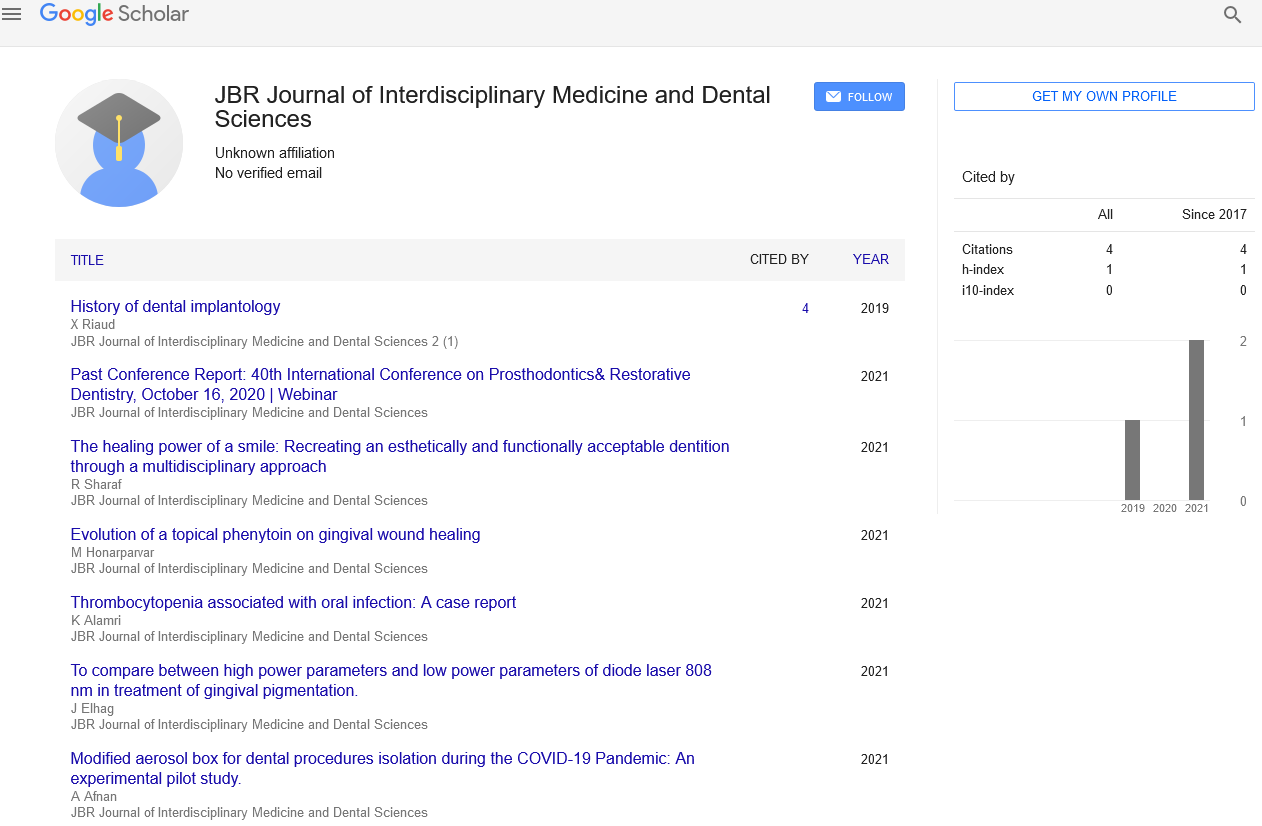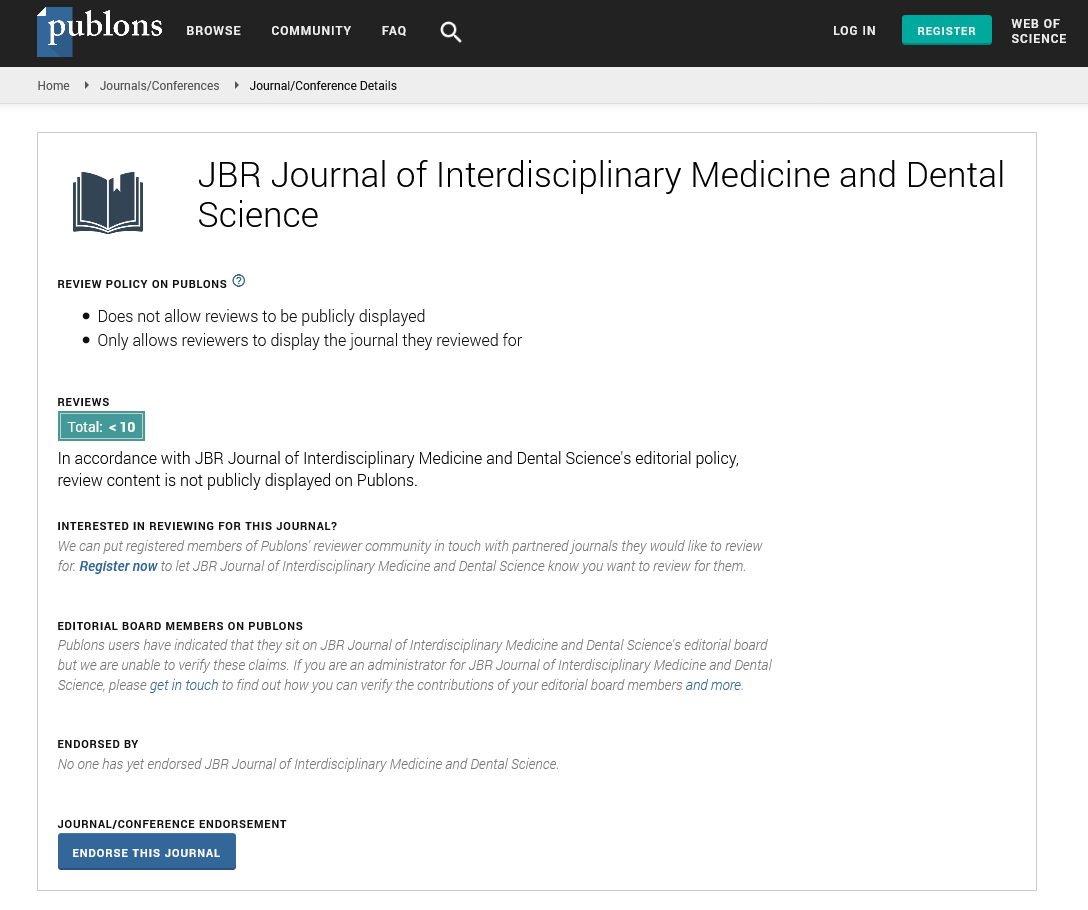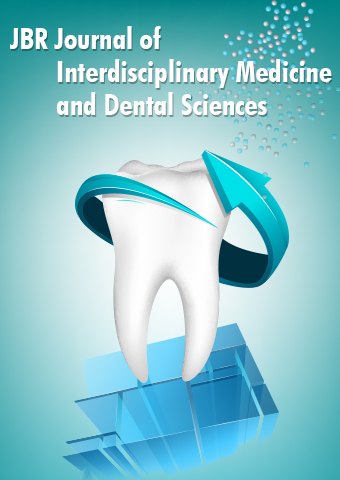Short Communication - JBR Journal of Interdisciplinary Medicine and Dental Sciences (2023) Volume 6, Issue 4
Embracing Functional Medicine: A Holistic Approach to Healing
Marshal Jack*
Department of Dental Sciences, Brazil
Department of Dental Sciences, Brazil
E-mail: jack_marshal@gmail.com
Received: 1-July-2023, Manuscript No. jimds-23-108166; Editor assigned: 4-July-2023, PreQC No. jimds-23-108166 (PQ); Reviewed: 19-July-2023, QC No. jimds-23-108166; Revised: 24-July-2023, Manuscript No. jimds-23-108166 (R); Published: 31-July-2023, DOI: 10.37532/2376- 032X.2023.6(4).79-81
Abstract
Functional medicine is an emerging healthcare paradigm that seeks to address the root causes of illness by taking a holistic and personalized approach to healing. Unlike conventional medicine, which often focuses on symptom management, functional medicine aims to understand the interconnectedness of various body systems and the impact of lifestyle, environment, and genetics on health. This article explores the key principles of functional medicine, including personalized care, root cause analysis, and integrative therapies. It highlights the benefits of functional medicine, such as improved chronic disease management, patient empowerment, and a reduced reliance on pharmaceuticals. By emphasizing prevention and supporting the body’s natural healing abilities, functional medicine offers a promising path towards long-term health and wellness. As this innovative approach gains momentum, it has the potential to transform the healthcare landscape, fostering a more patient-centered and holistic approach to healthcare.
Keywords
Functional medicine • Holistic approach • Personalized care • Root cause analysis • Integrative therapies
Introduction
In recent years, the field of healthcare has witnessed a paradigm shift as a growing number of practitioners and patients embrace a novel and patient-centered approach known as functional medicine [1]. Rooted in the recognition of the intricate interplay between various body systems and the influence of lifestyle, environment, and genetics on health, functional medicine stands in stark contrast to conventional medicine’s symptom-focused methodology [2]. By seeking to identify and address the underlying causes of illness rather than merely alleviating symptoms, functional medicine offers a holistic and personalized path to healing. This introduction serves as a gateway to understanding the principles, benefits, and potential implications of functional medicine in transforming the way we approach healthcare [3]. Through the exploration of key concepts, such as personalized care, root cause analysis, and the integration of traditional and alternative therapies, we gain insight into the multifaceted nature of this revolutionary approach. Moreover, this article delves into the significant advantages of functional medicine, including its potential to manage chronic diseases more effectively, empower patients to actively participate in their healing journey, and reduce reliance on pharmaceutical interventions [4]. By emphasizing prevention and leveraging the body’s innate healing capacities, functional medicine embodies a proactive stance towards overall well-being and longevity. As we explore the possibilities and challenges of functional medicine, we gain a glimpse into how this transformative approach has the potential to redefine the healthcare landscape, paving the way for a more patient-centric and comprehensive healthcare system that seeks to optimize health and vitality at every level [5].
Material and Methods
Functional medicine is an innovative and patient-centered approach to healthcare that seeks to identify and address the root causes of illness rather than merely treating symptoms. Developed as a response to the limitations of conventional medicine, functional medicine aims to restore health and well-being by considering the interconnectedness of various body systems and the impact of lifestyle, environment, and genetics on overall health [6]. This article delves into the principles and benefits of functional medicine, highlighting its role in transforming the healthcare landscape.
Understanding functional medicine
Functional medicine views the body as an intricate web of interconnected systems, working in harmony when in balance. However, imbalances can occur due to a range of factors, such as poor nutrition, chronic stress, lack of exercise, environmental toxins, and genetic predispositions. Instead of addressing each symptom in isolation, functional medicine practitioners take a holistic approach to understand the underlying causes of dysfunction and disease [7].
Key principles of functional medicine
Personalized and Patient-Centered Care: Functional medicine treats each patient as a unique individual with distinct genetic makeup, lifestyle, and environmental influences [8]. Treatment plans are tailored to suit the specific needs of the patient, fostering a strong doctorpatient relationship and empowering individuals to take an active role in their healing journey.
Identifying root causes: Rather than suppressing symptoms, functional medicine seeks to identify and address the root causes of health issues. Practitioners use in-depth assessments, advanced laboratory testing, and detailed medical history to gain a comprehensive understanding of the patient’s health status [9].
Integrating traditional and alternative approaches: Functional medicine integrates the best of both traditional medical practices and evidence-based alternative therapies. This approach allows practitioners to draw from a vast array of tools and techniques, promoting comprehensive healing.
Emphasis on prevention: A cornerstone of functional medicine is the prevention of illness and the promotion of overall wellness. By identifying and addressing imbalances before they manifest as disease, functional medicine aims to optimize health and longevity [10].
Supporting the body’s healing abilities: Functional medicine recognizes the body’s remarkable ability to heal itself when given the right conditions. By removing obstacles to health and providing necessary support, functional medicine helps facilitate the body’s natural healing processes.
Benefits of functional medicine
Holistic approach: Functional medicine views the body as a whole, focusing on the interconnectedness of various systems. This approach allows for a deeper understanding of health issues and provides more comprehensive solutions.
Chronic disease management: Functional medicine is particularly effective in managing chronic conditions like diabetes, autoimmune disorders, and gastrointestinal problems. By addressing the underlying causes, patients often experience long-term relief and improvement in their quality of life.
Personal empowerment: Patients actively participate in their healing journey, gaining a sense of empowerment and responsibility for their health. This engagement often leads to better adherence to treatment plans and healthier lifestyle choices.
Reduced dependence on pharmaceuticals: Functional medicine aims to minimize the use of pharmaceuticals, especially for long-term management of chronic conditions. Instead, it emphasizes lifestyle modifications and natural interventions, reducing the risk of adverse side effects.
Prevention and longevity: By focusing on prevention and early intervention, functional medicine helps individuals maintain optimal health and minimize the risk of developing serious illnesses in the future.
Discussion
Functional medicine represents a paradigm shift in healthcare, providing a patient-centered, integrative, and preventative approach to healing. By addressing the root causes of illness and embracing personalized treatment plans, functional medicine offers a promising path towards improved health and well-being. As the field continues to evolve, it is likely to play an increasingly vital role in transforming the healthcare system and fostering a healthier society.
Conclusion
In conclusion, functional medicine represents a remarkable evolution in the field of healthcare, offering a paradigm that places the patient at the center of healing and embraces the complexity of human health. By delving beyond surface-level symptoms to identify and address the underlying root causes of illness, functional medicine offers a holistic and personalized approach to patient care. The key principles of functional medicine, including personalized care, root cause analysis, and the integration of traditional and alternative therapies, empower patients to take an active role in their well-being and healing process. Through this approach, individuals gain a deeper understanding of their health status, leading to more informed and proactive choices that support lasting wellness. One of the most significant benefits of functional medicine lies in its ability to manage chronic diseases more effectively. By focusing on prevention and early intervention, functional medicine aims to mitigate the progression of illnesses, potentially reducing the burden on healthcare systems and improving the overall quality of life for patients. Moreover, functional medicine’s emphasis on patient empowerment fosters a profound connection between healthcare providers and individuals seeking care. This collaborative approach not only builds trust but also encourages patients to make positive lifestyle changes and actively engage in their treatment plans. Additionally, functional medicine’s reduced reliance on pharmaceutical interventions and its promotion of natural healing abilities offer promising prospects for minimizing adverse side effects and optimizing long-term health outcomes. As functional medicine gains momentum, it has the potential to redefine the healthcare landscape, cultivating a system that prioritizes preventive measures, personalized care, and a deeper understanding of the human body’s intricate complexities. However, like any transformative approach, functional medicine faces challenges, including integrating its principles into existing healthcare structures and ensuring widespread accessibility. Nevertheless, as research and implementation continue to expand, functional medicine promises to positively impact the health and well-being of individuals and communities worldwide. In the face of an evolving healthcare landscape, functional medicine stands as a beacon of hope, signaling a more patient-centered, proactive, and comprehensive approach to healthcare that honors the uniqueness of each individual and embraces the power of prevention and personalized healing. As we move forward, the continued exploration and integration of functional medicine hold the potential to revolutionize healthcare, bringing us closer to a world where optimal health and vitality are accessible to all.
References
- Kuliev A, Verlinsky Y. Preimplantation diagnosis: A realistic option for assisted reproduction and genetic practice. Curr Opin Obstet Gynecol. 17, 179-183 (2005).
- Williams TN. Obaro SK Sickle cell disease and malaria morbidity: a tale with two tails. Trends in Parasitology. 27, 315-320 (2011).
- Kumar P, Radhakrishnan J, Chowdhary MA et al. Prevalence and Patterns of Presentation of Genetic Disorders in a Pediatric Emergency Department. Mayo Clinic Proceedings. 76, 777-783 (2001).
- Bick D, Bick SL, Dimmock DP et al. An online compendium of treatable genetic disorders. American Journal of Medical Genetics. Part C, Seminars in Medical Genetics. 187, 48-54 (2021).
- Lvovs D, Favorova OO, Favorov AV et al. A Polygenic Approach to the Study of Polygenic Diseases. Acta Naturae. 4, 59-71 (2012).
- Yoshiura K, Kinoshita A, Ishida T et al. A SNP in the ABCC11 gene is the determinant of human earwax type. Nat Genet. 38, 324-330 (2006).
- Allison AC. Genetic control of resistance to human malaria. Current Opinion in Immunology. 21, 499-505 (2009).
- Perkins BA, Ficociello LH, Silva KH et al. Regression of microalbuminuria in type 1 diabetes. N Engl J Med. 348, 2285-2293 (2003).
- Sadeghi M. Fracture strength and bending of fiber-reinforced composites and metal frameworks in fixed partial dentures.Frontiers in Dentistry. 99-104 (2008).
- Rabie ZH. Effect of Fiber Reinforcement on Fracture Resistance and Fracture Toughness for Long Span Provisional Restorations.Egyptian Dental Journal. 2491-2502 (2019).
Indexed at, Google Scholar, Crossref
Indexed at, Google Scholar, Crossref
Indexed at, Google Scholar, Crossref
Indexed at, Google Scholar, Crossref
Indexed at, Google Scholar, Crossref
Indexed at, Google Scholar, Crossref
Indexed at, Google Scholar, Crossref
Indexed at, Google Scholar, Crossref


